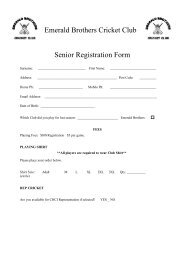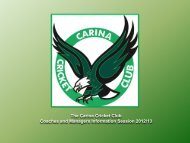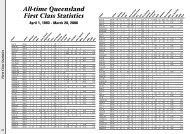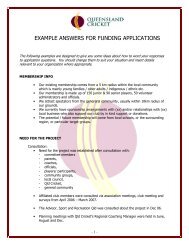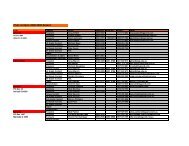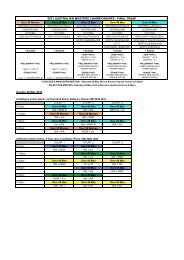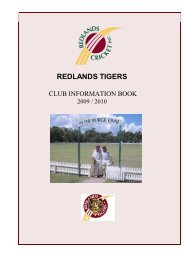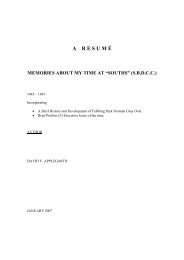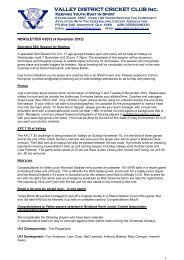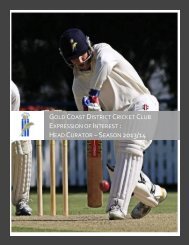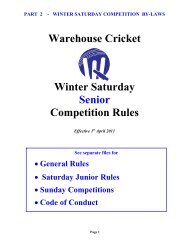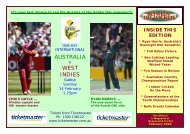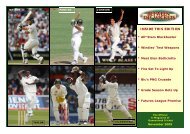the history of western suburbs district cricket club 1921-2002
the history of western suburbs district cricket club 1921-2002
the history of western suburbs district cricket club 1921-2002
You also want an ePaper? Increase the reach of your titles
YUMPU automatically turns print PDFs into web optimized ePapers that Google loves.
-16-1946-1968 JACK MCLAUGHLININTRODUCTIONWhen World War II finished on 25 August 1945, a new era in <strong>the</strong> <strong>history</strong> <strong>of</strong> Western Suburbs CricketClub was born.Some <strong>club</strong> members lost <strong>the</strong>ir lives in <strong>the</strong> war, o<strong>the</strong>rs had promising <strong>cricket</strong> careers interrupted butthankfully returned. Two <strong>of</strong> <strong>the</strong>se were Bob Stafford and Ern Toovey who survived <strong>the</strong> privations <strong>of</strong>Japanese Prisoner <strong>of</strong> War Camps.The American Artillery unit stationed on <strong>the</strong> No. 2 oval returned home to <strong>the</strong> States. Graceville Oval andWests returned to <strong>the</strong>ir former glory. The No.1 Oval looked resplendent with its white picket fence, <strong>the</strong>grandstand was filled with paying spectators for Saturday <strong>cricket</strong>, a turf pitch graced <strong>the</strong> No.3 oval, turfpractice wickets stood in front <strong>of</strong> <strong>the</strong> sight screen on No.1 oval and <strong>the</strong> pitches and playing surfaceregained its reputation <strong>of</strong> being <strong>the</strong> best in Brisbane.Cricket was back at Western Suburbs District Cricket Club.The motto for Wests at <strong>the</strong> time was not “I play with Western Suburbs” but “How well do I play forWestern Suburbs”.When <strong>the</strong> Intermediate Grade was introduced into <strong>the</strong> competition <strong>the</strong> committee likened it to a “SavingsBank” where <strong>the</strong> boys were <strong>the</strong> “<strong>club</strong>’s deposits”. If treasured carefully <strong>the</strong>se “Deposits” with <strong>the</strong>ir“Accumulated Interest” should in later years provide <strong>the</strong> <strong>club</strong> with a “Reserve Fund” which should protectit against “Player Insolvency”.A review <strong>of</strong> <strong>the</strong> records during this period bears testimony to <strong>the</strong> investment made.There is no doubt that <strong>the</strong> period under review was a “Golden Era” in <strong>the</strong> <strong>history</strong> <strong>of</strong> <strong>the</strong> <strong>club</strong>: between1945-6 and 1970-1 seasons.! 3 players were chosen in Australian teams! 3 players Captained <strong>the</strong> state! 22 players gained Interstate Representation! The A Grade competition was won on five occasions! The lower grades won 13 premierships! Wests won <strong>the</strong> Club Championship three times and finished no lower than third on nineoccasions.These great statistics could not have been obtained without <strong>the</strong> preparedness <strong>of</strong> older players droppingdown to <strong>the</strong> lower grades to nurture <strong>the</strong> development <strong>of</strong> our youngsters and <strong>the</strong> depth <strong>of</strong> quality playersthroughout <strong>the</strong> <strong>club</strong>.I trust this <strong>history</strong> which I have conveyed to <strong>the</strong> <strong>club</strong> gives <strong>the</strong> members some sense <strong>of</strong> pride that it hasgiven me as I relive <strong>the</strong> many matches and happy memories that only <strong>cricket</strong> can provide.Any omissions are unintentional for which I apologise.WESTERN SUBURBS - THE FAMILY CLUBThe years following World War II became known as <strong>the</strong> “Baby Boomer” years.Families were being reunited, money was not that plentiful, television was still years away in Australia,<strong>the</strong>re were no fast food outlets and shops did not trade after midday on Saturday. As a consequencefamilies had time to be associated with <strong>the</strong> <strong>club</strong>.Dad would be on <strong>the</strong> executive, or playing in <strong>the</strong> lower grades, mum would be helping in <strong>the</strong> refreshmentstall, junior would be playing in <strong>the</strong> Intermediate or Schoolboy Grade and our grandfa<strong>the</strong>r would be anassociated member <strong>of</strong> <strong>the</strong> <strong>club</strong> occupying his seat in <strong>the</strong> grandstand with his mates giving criticalcomment and praise on <strong>the</strong> players’ performances.Help and support was always available to players and families who were experiencing tragedy orpersonal difficulties.The following are some families associated with <strong>the</strong> <strong>club</strong> at that time:Freeman’s - George (fa<strong>the</strong>r and Hon Secretary), John and David. The Freeman Family providedaccommodation to Ray Reynolds and <strong>the</strong> Trimble boys.Shaw’s - Bert (fa<strong>the</strong>r and Hon Secretary), Hugh, Rog and Ken.Westaway’s - Ted (fa<strong>the</strong>r), John, Les and Colin.Arthy’s - Cliff (fa<strong>the</strong>r), Ted, Keith and Barry.McLaughlin’s - Red (fa<strong>the</strong>r), Jack, Pat and Michael.Draney’s - George (Asst Secretary), Neville and Alan.Draney’s - Pop (fa<strong>the</strong>r), John and Bill.Kricker’s - Cyril (fa<strong>the</strong>r and Treasurer), Les and Ge<strong>of</strong>f.McCasker’s - Les (fa<strong>the</strong>r and manager schoolboy teams), Ross and Kim.No doubt <strong>the</strong>re are many o<strong>the</strong>rs who deserve recognition but memory does not enable me to recall <strong>the</strong>m.Please accept my apologies for <strong>the</strong>ir omission.GRACEVILLE OVALSMany <strong>cricket</strong>ers are prone to complain about <strong>the</strong> state <strong>of</strong> <strong>the</strong> pitch or <strong>the</strong> surrounding areas for <strong>the</strong>paucity <strong>of</strong> <strong>the</strong>ir performances. The only answer to this is to give <strong>the</strong>m a hose and roller on a Mondaymorning and ask <strong>the</strong>m to prepare <strong>the</strong> grounds for next Saturday’s match. Then only will <strong>the</strong>y realise <strong>the</strong>difficulty facing our groundsmen in <strong>the</strong>ir effort to provide a stage where <strong>the</strong>y can act <strong>the</strong>ir part.Western Suburbs <strong>cricket</strong>ers have been fortunate over <strong>the</strong> years that <strong>the</strong> men holding <strong>the</strong> hose andpushing <strong>the</strong> roller have provided <strong>the</strong>m with what is recognised as one <strong>of</strong> <strong>the</strong> best playing surfaces inBrisbane.Things changed in this era. The turf pitch was replaced with a syn<strong>the</strong>tic surface and <strong>the</strong> dressing shedhas been removed from <strong>the</strong> No.3 oval. The wicket on <strong>the</strong> No.2 oval was relocated fur<strong>the</strong>r to <strong>the</strong> north..The picket fence and turf practice wickets on <strong>the</strong> No.1 oval were no longer <strong>the</strong>re. Syn<strong>the</strong>tic practicewickets and nets replaced <strong>the</strong>m on <strong>the</strong> west <strong>of</strong> <strong>the</strong> grandstand.



